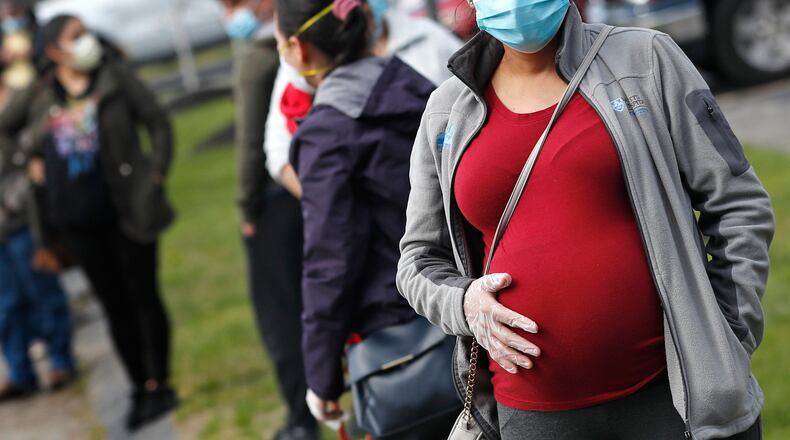In light of these rare but tragic cases, Dayton-area obstetric professionals are concerned that many pregnant women are not getting vaccinated against COVID-19. While over 70% of U.S. adults have received at least one dose of a coronavirus vaccine, only about 35% of pregnant women nationally are vaccinated, according to the latest data from the Centers for Disease Control and Prevention. The vaccine can prevent serious illness.
Olivia Dixon, a certified nurse midwife at Five Rivers Health Centers, said pregnant patients are still really hesitant about getting the shot despite health agencies’ recommendations.
“This is a conversation I’m having with every patient that I see,” she said. “What I am trying to reassure them is that all of the data that we have collected on the vaccine has shown no increase in risk to mom, baby or the pregnancy. And what we do know is that getting COVID during pregnancy can be really, really dangerous.”
Beavercreek-resident Jess Welz had a baby two months ago. The 27-year-old nurse who works in labor and delivery got two coronavirus vaccine doses during pregnancy and a booster shot recently after giving birth. Welz got vaccinated because she was more concerned about the risk of getting severe COVID-19 and resulting complications during pregnancy than she was about any rare negative side effect of the vaccine.
Overall, the risks of a healthy pregnant woman getting severe COVID-19 are low, but the chance is higher when compared to people who are not pregnant. For pregnant women who contract severe COVID-19, they are at increased risk of complications before and after birth.
A recently released CDC study found that while overall still rare, pregnant women with COVID-19 face an increased risk of stillbirths compared with uninfected women, and that risk rose to four times higher after the delta variant emerged.
Miami Valley Hospital was one of 33 hospitals that collected data for a study this year finding that pregnant patients with severe to critical COVID-19 symptoms were at higher risk than mild and asymptomatic coronavirus patients for high blood pressure disorders like preeclampsia, cesarean births and needing to give birth early.
Vaccinated people who have a breakthrough case are more likely to be asymptomatic. McKenna said he has not seen a vaccinated mom with COVID-19 experience complications; it has all been unvaccinated moms.
Dr. Robert Fresch has seen the impact putting a pregnant mother with severe COVID-19 on life support has on the entire family. Before coming to Kettering Medical Center to work as a maternal fetal medicine attending physician, he worked at a Cincinnati unit specializing in life-support care.
“I had a case where a mom was in respiratory failure and she was at 25 weeks gestation of her pregnancy and she was intubated and on the ventilator,” he said. “I watched a husband try to decide between what to do for care for his unborn child and his wife who’s on the ventilator … Fortunately for this case, with (life support) we were able to get this mother out to approximately 28 to 29 weeks of pregnancy before we ended up having to move forward with a delivery for preeclampsia.”
Health care providers said pregnant women are especially vulnerable to the plethora of misinformation that’s out there about the coronavirus vaccines.
Dixon encouraged pregnant women to discuss their concerns and fears about the COVID-19 vaccine with a medical professional.
“I’ve had patients who just need more information or want to talk about it more or haven’t gotten the information from a reliable source,” she said. “I let patients talk first about what their fears are and then I try and talk to them through what the facts are surrounding that specific fear. And I have had many patients that have changed their mind.”
Have questions about COVID-19, face masks, vaccines, testing, quarantining or anything else pandemic-related? Send them to jordan.laird@coxinc.com. Answers will be published regularly in print and online.
About the Author

